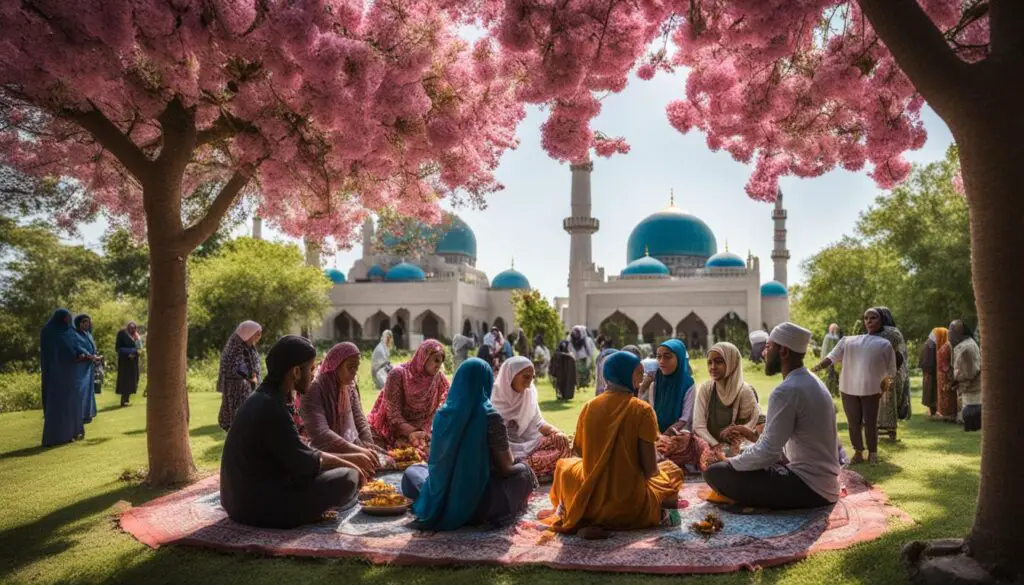Are you searching for inner peace and tranquility in a world full of stress and anxiety? Look no further than the prayer practices of Islam. Islam provides guidance and principles that can help you find serenity amidst the chaos of daily life.
Islamic prayer practices not only offer a spiritual connection with the divine but also promote mindfulness, gratitude, and balance. By incorporating these practices into your daily routine, you can experience a transformative journey towards peace and well-being.
Key Takeaways:
- Islamic prayer practices offer a pathway to finding serenity and inner peace.
- Maintaining a strong spiritual connection with Allah is integral to the transformative aspects of Islam.
- Prayer in Islam is not just a religious duty but also a means to achieve mindfulness and reflection.
- Seeking knowledge and understanding plays a significant role in alleviating anxiety and stress.
- Acts of charity and compassion enhance personal well-being and contribute to a sense of purpose.
The Transformative Aspects of Islam
Islam offers a transformative framework that enables individuals to find tranquility, alleviate anxiety, and experience profound spiritual growth. Through a deep connection with Allah, engaging in regular prayer rituals (salah), practicing gratitude, seeking knowledge, and fostering a sense of balance and moderation, Muslims can embark on a transformative journey of self-discovery and inner peace.
At the heart of Islamic spirituality are the Islamic prayer rituals, known as salah, which hold immense transformative power. Salah provides a direct line of communication with Allah, allowing Muslims to seek solace, guidance, and clarity. It serves as a profound reminder of our purpose in this world and nurtures a deep sense of spiritual fulfillment.
The foundational pillar of salah embodies the Muslim worship practices, offering Muslims a constant opportunity for reflection, self-improvement, and personal growth. By performing the five obligatory daily prayers, Muslims establish a routine that anchors their lives in devotion and mindfulness.
Through salah, individuals can immerse themselves in intimate conversations with Allah, seeking His blessing, forgiveness, and guidance. The various physical movements and positions involved in prayer, such as standing (qiyam), bowing (ruk’u), and prostrating (sujud), promote mindfulness and spiritual rejuvenation.

Salah serves as a transformative practice, elevating our connection with Allah and bringing peace to our hearts and minds.
Furthermore, gratitude plays a significant role in the transformative aspects of Islam. Muslims are encouraged to express gratitude for the blessings bestowed upon them, recognizing that every breath, every moment is a gift from Allah. This practice instills a positive mindset, fostering contentment and reducing the anxiety that often arises from comparison or unfulfilled desires.
Seeking knowledge is also an integral part of Islamic teachings, as Muslims are encouraged to acquire knowledge about the world and the principles of Islam. By seeking knowledge, individuals broaden their perspectives, gain insight into the interconnectedness of life, and equip themselves with the tools needed to navigate challenges and uncertainties.
The Islamic community, known as the Ummah, forms a strong support system that nurtures personal growth and transformation. Engaging in the Ummah, connecting with fellow believers, sharing experiences, and providing support create a sense of belonging and diminish feelings of isolation and anxiety.
The Path to Transformation: Embracing Islam’s Teachings
Embracing the transformative aspects of Islam requires a commitment to prayer, self-reflection, and personal growth. By incorporating regular salah, showing gratitude, seeking knowledge, nurturing a balanced lifestyle, and connecting with the Islamic community, individuals can unlock their spiritual potential, find peace within themselves, and experience a transformative journey guided by the principles of Islam.
The Importance of Prayer in Islam
Prayer is a fundamental aspect of Islamic faith, highlighting the significance of daily prayers in Islam. Muslims are obligated to perform five daily prayers, known as salah, at specific times throughout the day. These prayers hold immense importance in the lives of Muslims as they provide a regular opportunity for mindfulness, reflection, and connection with Allah.
Performing the five daily prayers offers a spiritual and mental sanctuary, fostering inner peace and promoting overall well-being. Each prayer acts as a means to refocus attention on the divine presence and seek solace in times of uncertainty or stress. Through the recitation of verses from the Quran, physical movements, and moments of stillness, Muslims find tranquility and a sense of purpose.
“And establish prayer and give zakah and bow with those who bow [in worship and obedience].” (Quran 2:43)
The five daily prayers serve as a means to establish and strengthen the bond between the worshipper and Allah. They create a space for reflection on one’s actions, seeking forgiveness, expressing gratitude, and seeking guidance. This regular connection through prayer is integral to nurturing spiritual growth and achieving a closer relationship with the Divine.
The importance of prayer in Islam extends beyond personal spiritual development. It fosters a sense of community and unity among Muslims. Gathering to pray in mosques or connecting virtually allows individuals to support and encourage one another in their faith journeys. This communal aspect of prayer reinforces the sense of belonging and shared commitment to the teachings of Islam.

The Five Daily Prayers in Islam
The five daily prayers are as follows:
| Prayer Name | Time of Prayer |
|---|---|
| Fajr | Pre-dawn, before sunrise |
| Dhuhr | After the sun has passed its zenith, around midday |
| Asr | In the afternoon, before sunset |
| Maghrib | Immediately after sunset |
| Isha | After twilight, before the complete disappearance of twilight |
Each prayer carries its own significance and purpose, contributing to the overall balance and rhythm of a Muslim’s day. The devotion and commitment to faithfully perform these prayers help strengthen the individual’s faith and bring them closer to Allah.
Through the observance of the daily prayers, Muslims find solace, guidance, and spiritual fulfillment. The practice of salah instills discipline, mindfulness, and a deep connection with Allah, allowing individuals to navigate life’s challenges with greater clarity, peace, and resilience.
The Spiritual Connection and Trust in the Divine Plan
In Islam, believers are encouraged to establish a strong spiritual connection with Allah, the Almighty. Central to this connection is the concept of trust in His divine plan. Trusting in the divine plan means placing complete faith in Allah’s wisdom, guidance, and purpose for our lives.
This unwavering trust provides believers with immense comfort and solace, especially during times of uncertainty or hardship. It allows individuals to surrender their anxieties and worries, knowing that Allah’s plan is perfect and designed for their ultimate good.
Through trust in the divine plan, individuals can find peace in any circumstance, knowing that everything happens for a reason and that Allah’s wisdom surpasses our limited understanding. It is a profound recognition that even in the face of challenges, there is a greater purpose at play.
Islamic teachings emphasize the importance of accepting both blessings and difficulties as part of Allah’s divine plan. Blessings are seen as rewards for faith and righteousness, while difficulties are considered tests of character and opportunities for growth.
“And We will surely test you with something of fear and hunger and a loss of wealth and lives and fruits, but give good tidings to the patient, Who, when disaster strikes them, say, ‘Indeed we belong to Allah, and indeed to Him we will return.’” (Quran 2:155-156)
Through this trust in the divine plan, Muslims find solace and resilience in the face of adversity. It helps to alleviate anxiety and provide a sense of purpose, knowing that every experience is part of Allah’s greater design.
By cultivating a deep connection with Allah and placing trust in His divine plan, individuals can navigate life’s challenges with grace and perseverance, finding peace in the knowledge that their ultimate destiny lies in the hands of the Almighty.
| Key Points | Benefits |
|---|---|
| A strong spiritual connection with Allah | Inner peace and comfort |
| Trust in the divine plan | Alleviation of anxiety |
| Acceptance of hardships as tests | Resilience and growth |
| Blessings as rewards | Gratitude and contentment |
| Recognition of Allah’s wisdom | Sense of purpose and direction |
The Power of Prayer and Meditation
Salah, the Islamic prayer ritual, is a profound practice that incorporates moments of mindfulness and meditation throughout the day. As Muslims engage in salah, they experience physical movements and positions that create a serene atmosphere, offering mental clarity and reducing stress and anxiety.
The various positions involved in salah, such as bowing (ruk’u) and prostrating (sujud), have a transformative effect on the mind and body. These positions promote flexibility, balance, and a deep connection with Allah. The act of bowing humbly before the Creator and prostrating in complete submission fosters a sense of surrender and tranquility.
“During salah, I find solace in bowing down to Allah. It allows me to let go of my worries and fears, surrendering them entirely to Him. The physical act of prostration helps me find inner peace and clarity.”
– Sarah, a practicing Muslim
Practicing salah in the prescribed positions not only benefits the body’s physical well-being but also enhances mental and emotional wellness. The deliberate movements and postures enable individuals to focus their attention on the present moment, creating a space for reflection, gratitude, and spiritual connection. This unique blend of physical and mental engagement cultivates a sense of inner peace and rejuvenation.
It’s important to note that while salah is rooted in Islamic teachings, people from various backgrounds can incorporate elements of these prayer positions into their own meditation practices. The physicality of the positions helps individuals ground themselves and find stillness, leading to a greater sense of calm and mental clarity.
The Benefits of Islamic Prayer Positions
The prayer positions in salah offer numerous benefits that contribute to overall well-being:
- Mindfulness: The deliberate movements and focus on synchronizing breath with physical postures promote mindfulness and presence.
- Mental Clarity: Engaging in salah provides a mental break from daily stressors, allowing individuals to regain focus and clarity of mind.
- Reduced Anxiety: The meditative aspects of salah help reduce anxiety by promoting relaxation and a sense of inner peace.
- Physical Flexibility: Regular practice of the prayer positions in salah can improve flexibility, posture, and physical well-being.
- Spiritual Connection: The prayer positions deepen the spiritual connection with Allah, fostering a sense of devotion and tranquility.
By incorporating Islamic prayer positions into their daily lives, individuals can harness the power of prayer and meditation to cultivate inner peace, reduce anxiety, and foster spiritual growth.
| Prayer Position | Description |
|---|---|
| Bowing (Ruk’u) | With feet shoulder-width apart, individuals bow forward from the waist, placing their hands on their knees. The gaze is focused on the ground. |
| Prostrating (Sujud) | Individuals kneel and place their forehead, nose, palms, and toes on the ground. The arms rest on the thighs, and the gaze is directed toward the ground. |

The bowing and prostrating positions in salah symbolize humility, surrender, and the recognition of Allah’s greatness. As individuals engage in these physical postures, they create a sacred space for self-reflection, spiritual connection, and relief from stress and anxiety.
Gratitude and Contentment in Islam
In Islam, gratitude and contentment play a significant role in cultivating a positive mindset and alleviating anxiety. The benefits of Muslim prayer extend beyond the act itself, encouraging individuals to recognize and appreciate the blessings bestowed upon them, no matter how small.
Through daily prayers (salah), Muslims are reminded to express gratitude to Allah for His countless blessings. Prayer becomes a moment of reflection, allowing believers to acknowledge the abundance in their lives and foster a sense of contentment. By focusing on gratitude, the mind shifts away from comparison and material desires, reducing anxiety and promoting peace.
“Gratitude turns what we have into enough.” – Melody Beattie
Islam teaches that true contentment lies not in the accumulation of worldly possessions, but in recognizing the blessings already present. By embracing gratitude, individuals are reminded of the immense value of intangible gifts such as health, family, and faith. This realization cultivates a genuine sense of contentment, freeing one from the anxieties of constantly seeking external validation or material gain.
Practicing gratitude also inspires acts of kindness and generosity towards others, as Muslims are encouraged to share their blessings with those in need. This selflessness further enhances the sense of contentment and fulfillment derived from expressing gratitude.
In summary, gratitude and contentment are integral aspects of Islamic teachings that contribute to overall well-being. Through the benefits of Muslim prayer and the cultivation of gratitude, individuals can find inner peace and tranquility, freeing themselves from the grip of anxiety.

The Role of Community Support
The Islamic community, or Ummah, plays a crucial role in providing a strong support system for individuals. In Islam, community support is deeply ingrained, fostering a sense of belonging, connection, and unity among believers.
When individuals connect with fellow Muslims, they are welcomed into a community that values empathy, compassion, and understanding. Sharing experiences, both joyful and challenging, helps forge deep bonds and allows individuals to find solace in knowing that they are not alone in their struggles.
This sense of community support goes beyond just sharing stories; it extends to actively engaging in acts of kindness and service towards one another. By reaching out and helping those in need, Muslims strengthen the bonds of brotherhood and sisterhood within the Ummah. This support system creates a network of compassionate individuals who are always ready to lend a helping hand, reducing feelings of isolation and fostering a greater sense of belonging.
“The example of the believers in their affection, mercy, and compassion for each other is that of a body. When any limb aches, the whole body reacts with sleeplessness and fever.” – Prophet Muhammad (peace be upon him)
The Islamic community serves as a source of comfort and solace during difficult times. Whether it’s offering words of encouragement, providing material support, or simply being present to listen, the Ummah stands united in providing emotional support to those in need. This collective support system not only eases anxiety but also strengthens individual resilience in the face of challenges.
Moreover, being part of the Islamic community allows individuals to benefit from the wealth of knowledge and wisdom shared within. By engaging in discussions, attending lectures and religious classes, and seeking guidance from scholars and knowledgeable members of the Ummah, individuals can find guidance and understanding to navigate life’s trials and tribulations more effectively.

Through community support, individuals find comfort, guidance, and a sense of belonging in the Islamic community. The Ummah serves as a constant reminder that they are not alone in their struggles, providing a support system that aids in reducing feelings of isolation and anxiety. By coming together, sharing experiences, and offering acts of kindness, the Islamic community strengthens the bonds of unity, compassion, and support that are at the heart of Islam.
Seeking Knowledge and Understanding
Islam places a significant emphasis on seeking knowledge and understanding, both of the world around us and its teachings. By actively educating ourselves about life’s intricacies and delving into the wisdom of Islam, we equip ourselves with the tools needed to navigate stress and anxiety more effectively.
Seeking knowledge in Islam goes beyond the mere accumulation of facts; it encompasses a holistic approach to personal growth and spiritual enlightenment. It is a continuous journey that fuels our intellectual curiosity and expands our understanding of the world.
“Seek knowledge from the cradle to the grave.”
– Prophet Muhammad (peace be upon him)
Through the pursuit of knowledge, we gain insights that allow us to cultivate resilience, broaden our perspectives, and develop critical thinking skills. This, in turn, enables us to confront the challenges of life with wisdom, while nurturing a deep sense of purpose and inner peace.
Knowledge as a Path to Tranquility
Islam teaches that knowledge is not only a means of acquiring worldly success but also a path to spiritual serenity. By seeking knowledge, we gain a deeper understanding of Allah’s magnificent creation and His divine wisdom, fostering awe and reverence for the natural world.
Moreover, knowledge grants us the ability to discern between right and wrong, thus empowering us to make informed decisions in all aspects of life. It enables us to navigate through the complexities of the modern world, finding solace in the teachings of Islam and drawing inspiration from the wisdom imparted by scholars and spiritual leaders.
Methods of Seeking Knowledge in Islam
The Islamic tradition provides various avenues for seeking knowledge and gaining a deeper understanding of the faith. These include:
- Studying the Quran: The Quran is considered the ultimate source of divine wisdom in Islam. Exploring its verses and reflecting upon its teachings allows us to uncover profound insights and guidance for our lives.
- Learning from Scholars: Engaging with knowledgeable scholars and teachers allows us to benefit from their expertise and insights into the teachings of Islam. Their wisdom and experience provide valuable guidance in navigating the complexities of life.
- Attending Islamic educational programs: Participating in educational programs and courses offered by Islamic institutions or community centers provides structured learning opportunities. These programs cover a wide range of topics, enabling individuals to deepen their understanding of Islam.
The Transformative Power of Knowledge
The pursuit of knowledge in Islam holds the potential to transform individuals and societies. By seeking knowledge, we equip ourselves with the tools to challenge harmful misconceptions and spread a more accurate understanding of Islam in an increasingly interconnected world.
Furthermore, knowledge enhances our ability to connect with fellow human beings, fostering empathy and understanding across cultural and religious boundaries. It enables us to promote peace, justice, and harmony in our communities by advocating for truth, compassion, and the betterment of society.
| Benefits of Seeking Knowledge in Islam | Impact on Individuals and Society |
|---|---|
| Intellectual growth and personal development | Empowers individuals to contribute positively to society |
| Strengthened faith and spiritual growth | Enhances the overall well-being of individuals |
| Promotes critical thinking and problem-solving abilities | Encourages innovation and progress |
| Encourages lifelong learning and continuous self-improvement | Nurtures a culture of intellectual curiosity |
The Importance of Moderation and Balance
In Islam, moderation and balance play a crucial role in leading a fulfilling and peaceful life. The teachings of Islam advocate for a harmonious lifestyle that encompasses mental, emotional, and physical well-being. By embracing moderation and balance, individuals can prevent excessive behaviors that often lead to anxiety and stress.
Islamic principles encourage believers to find equilibrium in all aspects of life, whether it be in their relationships, work, or personal pursuits. Striking a balance allows individuals to maintain a healthy mindset, avoid burnout, and cultivate inner peace.
“And thus, We have made you a balanced nation that you will be witnesses over the people and the Messenger will be a witness over you…” (Quran 2:143)
The Virtues of Moderation
Moderation fosters contentment and prevents extremes, providing individuals with a sense of control and stability. By maintaining a moderate approach, one can navigate challenges with resilience and make informed decisions based on reason and reflection.
“Take the middle course; be moderate, neither excessive nor deficient.”
Whether it is in personal ambitions, material possessions, or emotional reactions, moderation ensures that individuals do not become consumed by excess or overwhelmed by scarcity. By finding the middle path, Muslims can navigate the complexities of life with wisdom and tranquility.
Attaining Balance
Islam acknowledges that achieving balance requires conscious effort and continuous self-reflection. It encourages believers to assess their thoughts, actions, and priorities regularly. Through mindfulness and self-awareness, individuals can identify areas that are imbalanced and take steps to restore equilibrium.
Practicing moderation and balance involves setting realistic goals, managing time effectively, and nurturing healthy relationships. It also means embracing self-care and taking the necessary steps to maintain one’s well-being.
The Impact of Moderation on Mental Health
Moderation and balance have a direct impact on mental health, promoting emotional stability and overall well-being. By avoiding extremes and excessive behaviors, individuals can reduce feelings of overwhelm, anxiety, and stress.
The pursuit of moderation helps individuals develop resilience and adaptability, enabling them to cope better with life’s challenges. It fosters a positive mindset, leading to enhanced self-esteem and greater satisfaction in all aspects of life.
Embracing moderation and balance in Islam not only promotes harmony within oneself but also extends to interactions with others and society as a whole. It encourages compassion, empathy, and the fostering of positive relationships.
The Role of Moderation in Islam
Moderation is not only a personal practice but also a principle within the Islamic faith. Islam advocates for balanced living, emphasizing the importance of maintaining equilibrium in all aspects of life.
“And thus, we have made you a just community that you will be witnesses over the people and the Messenger will be a witness over you…” (Quran 2:143)
This principle extends to areas such as financial matters, indulgence, and personal conduct. It reminds individuals that immoderate behavior can lead to negative consequences and disrupt the overall peace and tranquility of society.
Embracing moderation and balance in Islam allows individuals to lead a purposeful, fulfilling, and serene life. By finding equilibrium and avoiding excess, Muslims can cultivate inner peace and contribute to the well-being of their communities.
Acts of Charity and Compassion
In Islam, engaging in acts of charity and showing compassion towards others is not only a religious duty but also a means to enhance one’s overall well-being. The act of selfless giving and kindness contributes to a sense of purpose, happiness, and ultimately alleviates anxiety.
The teachings of Islam emphasize the importance of extending a helping hand to those in need, regardless of their race, religion, or social status. Whether it is giving to the poor, feeding the hungry, or caring for the sick, acts of charity reflect the core values of compassion, empathy, and solidarity within the Muslim community.
“The believer’s shade on the Day of Resurrection will be his charity.”
– Prophet Muhammad (peace be upon him)
By participating in acts of charity, Muslims reaffirm their commitment to serving humanity, spreading love, and improving the lives of others. These acts not only bring joy to those receiving the help but also ignite a sense of fulfillment and satisfaction within the hearts of the givers.
Moreover, acts of charity provide an opportunity for Muslims to grow spiritually and develop a deeper connection with Allah. By selflessly giving and sacrificing for the sake of others, believers demonstrate their gratitude for the blessings bestowed upon them and show their trust in the divine plan.
Charitable acts can take many forms, from donating money and resources to volunteering time and skills. Muslims are encouraged to cultivate an attitude of generosity and compassion in their daily lives, constantly seeking opportunities to support those in need.
The Rewards of Charity in Islam
In Islam, the impact of acts of charity extends beyond the immediate material benefit. Muslims believe that such actions have immense spiritual rewards and will be recognized by Allah in the hereafter.
Charitable deeds are seen as a means to purify one’s wealth and nurture a selfless and generous character. Additionally, acts of charity are believed to have the power to expiate sins and protect believers from calamities and hardships.
Islam teaches that even the smallest acts of kindness can have a ripple effect, inspiring others within the community to engage in similar acts of charity. By collectively embracing this principle, Muslims can create a society characterized by compassion, empathy, and solidarity.
Through acts of charity and compassion, Muslims find fulfillment, purpose, and a profound sense of well-being. By extending a helping hand to those in need and embodying the values of Islam, believers can alleviate anxiety and create a better world in the process.
Realizing Liberation from Anxiety through Islam
By embracing the wisdom and teachings of Islam, individuals can find liberation from anxiety and achieve a profound sense of peace. The Islamic system offers a holistic approach through prayer, community support, gratitude, seeking knowledge, moderation, and acts of charity.
Benefits of Muslim Prayer
One of the key practices in Islam is the daily performance of salah, or Muslim prayer. The benefits of Muslim prayer extend beyond the spiritual realm, impacting one’s mental and physical well-being as well. Here are some of the benefits:
- Stress reduction: Engaging in regular prayer promotes relaxation and reduces stress levels, allowing for a calmer state of mind.
- Mental clarity: The mindfulness and focus required during prayer enhance mental clarity, aiding in decision-making and problem-solving.
- Emotional well-being: Prayer provides a unique opportunity for self-reflection, gratitude, and surrender, leading to improved emotional well-being and a greater sense of contentment.
- Physical relaxation: The physical movements and positions within the prayer ritual promote relaxation of the muscles and release tension from the body.
- Connection with a higher power: Prayer strengthens the bond between the individual and Allah, fostering a sense of peace and security in knowing that one is never alone.
How to Perform Salah in Islam
Performing salah is a fundamental ritual in Islam. Here is a step-by-step guide on how to perform salah:
- Make the intention to perform salah.
- Perform ablution (wudu) by washing the hands, mouth, nose, face, arms, head, and feet.
- Stand facing the qibla (the direction of the Kaaba in Mecca).
- Raise both hands to the level of the ears and say “Allahu Akbar” (Allah is the Greatest) to start the prayer.
- Recite the opening supplication and seek refuge in Allah from Satan.
- Recite the first chapter of the Quran, Al-Fatiha.
- Recite additional verses or chapters from the Quran.
- Bow down (ruk’u) and recite the supplication.
- Stand upright after the bowing and recite “Sami’Allahu liman hamidah” (Allah hears those who praise Him).
- Prostrate (sujud) and recite the supplication.
- Sit between the two prostrations and recite the supplication.
- Repeat the prostration and sitting positions for the second unit (rakah) of the prayer.
- Tashahhud – Sit on the left leg and recite the final supplication while turning the head to the right and left.
- End the prayer by turning the head to the right and saying “Assalamu alaikum wa rahmatullah” (Peace be upon you and the mercy of Allah) and then turning the head to the left and saying the same.
Regular prayer practice in Islam, combined with other aspects of the faith, can bring about a deep sense of peace and liberation from anxiety. Whether performed individually or in congregational settings, salah serves as a powerful tool for achieving tranquility and connecting with the divine.
Conclusion
The prayer practices of Islam, including the Islamic prayer rituals and Muslim worship practices, hold immense significance in the lives of believers. The importance of prayer in Islam cannot be overstated as it serves as a means of finding serenity, solace, and relief from anxiety. By engaging in these prayer practices, individuals can embark on a transformative spiritual journey.
Through regular prayer, Muslims establish a deep connection with Allah, seeking His guidance and blessings. The five daily prayers in Islam offer moments of mindfulness, reflection, and gratitude, enabling believers to find inner peace and rejuvenation in their souls. By assuming different prayer positions, such as bowing and prostrating, a serene atmosphere is created, fostering mental clarity and reducing stress and anxiety.
Moreover, the prayer practices of Islam are not limited to personal devotion alone. Islamic worship also highlights the significance of community support and a sense of belonging. The Islamic Ummah, or community, provides a strong support system where individuals can connect with fellow believers, share experiences, and engage in acts of kindness. This community support enhances spiritual well-being and diminishes feelings of isolation and anxiety.
Understanding the true essence of Islam and its profound teachings also plays a pivotal role in alleviating anxiety. Islam emphasizes the pursuit of knowledge, both worldly and religious, as a means of equipping oneself with the tools to cope with stress and anxiety effectively. By practicing moderation and balance in all aspects of life and engaging in acts of charity and compassion, individuals can find purpose, contentment, and relief from anxiety through the beautiful prayer practices of Islam.
FAQ
What are the prayer practices of Islam?
The prayer practices of Islam, known as salah, involve performing five daily prayers at specific times. These prayers provide an opportunity for mindfulness, reflection, and connection with Allah.
What are the Islamic prayer rituals?
The Islamic prayer rituals involve specific physical movements and positions, such as bowing (ruk’u) and prostrating (sujud), which create a serene atmosphere and offer mental clarity.
How important is prayer in Islam?
Prayer is a fundamental aspect of Islamic faith. Muslims are obligated to perform five daily prayers, which promote inner peace, spiritual well-being, and a strong connection with Allah.
How does Islam promote trust in the divine plan?
Islam encourages believers to trust in Allah’s divine plan, seeing hardships as tests and blessings as rewards. This trust and acceptance can help alleviate anxiety and provide a sense of purpose.
How does prayer and meditation help in Islam?
Salah, the Islamic prayer ritual, promotes regular moments of mindfulness and meditation throughout the day. It reduces stress and anxiety through physical movements and positions, creating a serene atmosphere.
How does Islam emphasize gratitude and contentment?
Islam emphasizes gratitude and contentment with the blessings one has been bestowed. Recognizing and appreciating these blessings fosters a positive mindset and reduces anxiety stemming from comparison or material desires.
What is the role of community support in Islam?
The Islamic community, or Ummah, provides a strong support system for individuals. Connecting with fellow believers, sharing experiences, and engaging in acts of kindness towards others enhances feelings of belonging and reduces feelings of isolation and anxiety.
How does Islam encourage seeking knowledge and understanding?
Islam encourages individuals to seek knowledge and understanding of both the world and its teachings. Educating oneself about life’s intricacies and learning about Islam equips individuals with the tools needed to cope with stress and anxiety more effectively.
What is the importance of moderation and balance in Islam?
Islam promotes moderation and balance in all aspects of life. It advocates for a harmonious lifestyle that encompasses mental, emotional, and physical well-being, preventing excessive behaviors that often lead to anxiety and stress.
How do acts of charity and compassion contribute to well-being in Islam?
Acts of charity and compassion are not only religious duties in Islam but also enhance one’s well-being. Engaging in acts of kindness contributes to a sense of purpose and happiness, alleviating anxiety.
How does Islam help in finding liberation from anxiety?
By embracing the wisdom and teachings of Islam, individuals can find liberation from anxiety and achieve a profound sense of peace. The prayer practices, community support, gratitude, seeking knowledge, moderation, and acts of charity in Islam offer a holistic approach to inner peace and spiritual growth.









